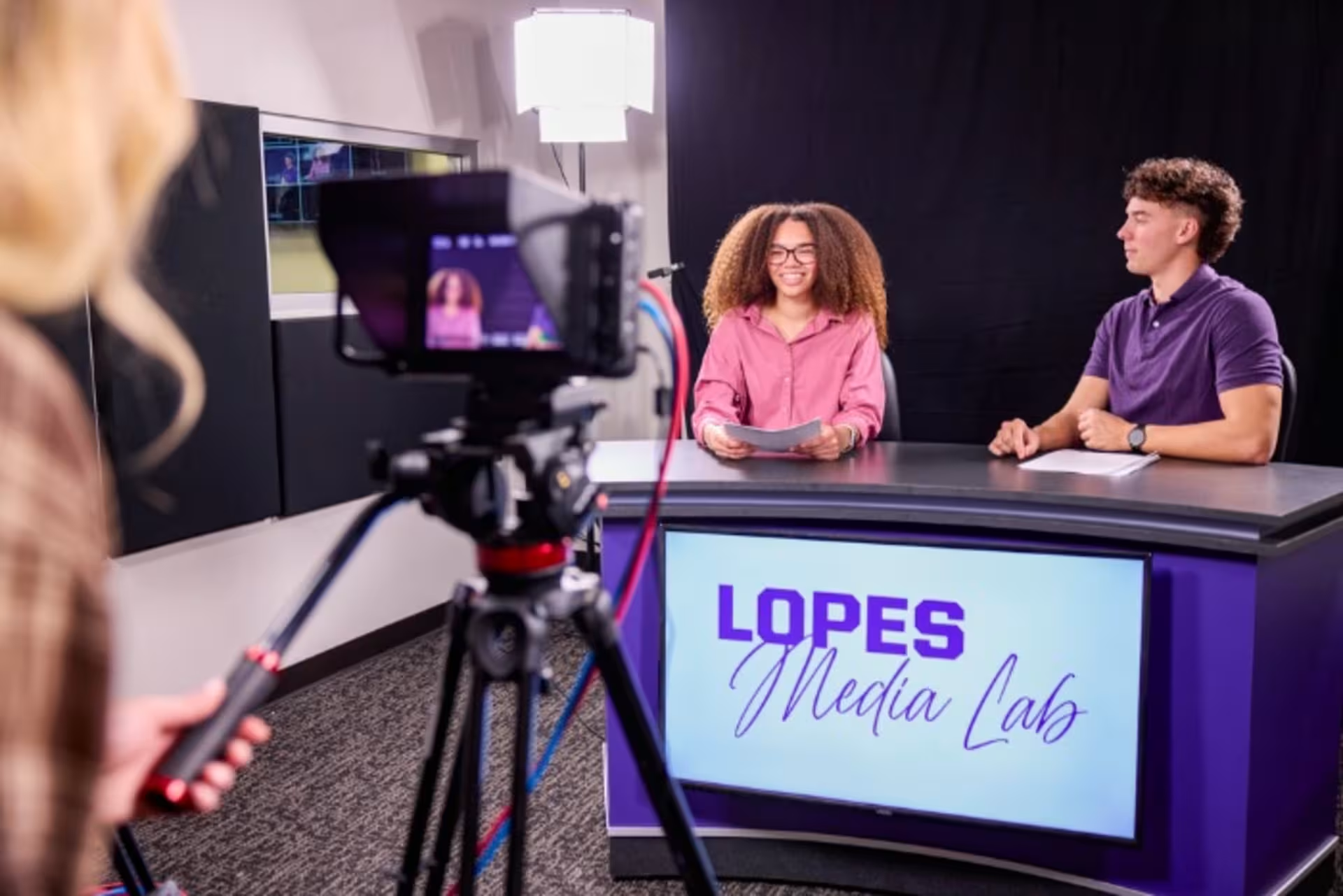
BA in Communications: Broadcasting and New Media Emphasis
Begin Your Career in Broadcasting and New Media
New media and broadcasting encompasses any form of interactive media that relies on a computer for distribution. This includes, but is not limited to, blogs, virtual reality, social media, online newspapers, podcasts and digital games.
Broadcasting and new media is constantly being updated and can be easily retrieved, hyperlinked, searched for and accessed. One reason why companies turn to new media is so they can narrow their target audience, as traditional media only allows companies to target a broad audience. Additionally, modern broadcasting media can allow for interactive elements to boost user engagement.

Online: $485 per credit [More Info]
Up to 90 credits, only 84 can be lower division
Credits: Fill out the Lopes Eval to find out what will transfer
Admission Requirements (Bachelor's)
- 16+ years old
- High School Graduate
- 3.0+ Unweighted GPA
OR 2.5+ Unweighted GPA and
- ACT: 19
- SAT: 1000*
Admission requirements may differ based on degree level, program and modality, or transfer status. Some programs of study may require a higher GPA and/or other qualifying criteria for admission. Please review full admission and program requirements in the University Policy Handbook.
*Math and reading only on a 1600 point scale (test date after 3/1/2016). SAT score of 1380 required for 2400 point scale (test date before 3/1/2016).
Earn Your BA in Communications Online
The College of Humanities and Social Sciences at Grand Canyon University offers the Bachelor of Arts (BA) in Communications with an Emphasis in Broadcasting and New Media for students who are passionate about mass communications and media.
This program focuses on developing skills to interpret visual and verbal communication in the mainstream and social media, examining modern communication techniques and learning about theories of mass media, as well as the characteristics and effects of mass communications channels. The media broadcasting emphasis teaches you the skills and knowledge to appeal to consumers by creating effective press releases, podcasts, social media and news stories.
This undergraduate program is available online. The online courses are available through GCU’s digital learning platform, allowing you to complete your undergraduate program on a more flexible and convenient schedule. While you take online media broadcasting courses, you will have access to knowledgeable faculty and to networking opportunities with your peers.
New Media and Broadcasting Class Topics
To finish this 120-credit program, you must successfully complete classes that explore a range of topics, including:
Median annual wage for media and communication workers in May 2023(See disclaimer 1)
Communications Capstone
Courses in this program are taught by seasoned instructors who share knowledge and experience in their respective fields. In addition to passing the courses, you are required to showcase what you’ve learned in this program by completing a communications capstone.
Media and Broadcasting Skills
When you enroll in the bachelor’s in communications program at GCU, you will have the opportunity to develop your skills in new media broadcasting technologies by:
You will also be taught the foundational knowledge and skills needed to create broadcast and podcast messaging. In addition to classroom instruction, you will have the opportunity to apply your skills and showcase your progress with both of these mediums in your broadcasting class.

Broadcasting Media Career Paths
When you graduate with a bachelor’s in communications with a focus in new media broadcasting, you will have the opportunity to pursue a range of positions. Although no guarantees can be made regarding career outcomes, you may decide to seek a career in advertising, marketing, public relations or print or broadcast journalism.
Some career possibilities within this field include the following:
Public relations manager
Postsecondary communications teacher
Broadcast announcer
Radio disc jockey
Public relations specialists
Writer
Author
Media and communication worker
Enroll in Broadcasting Courses From an Accredited University
GCU is an institutionally accredited university offering degree programs that can help prepare students for digital technology-related careers. If you’re excited about the possibilities in new media and broadcasting, you may find our blend of classroom instruction and hands-on learning activities to be the right fit for you. With classes available online, this broadcasting media emphasis offers flexibility as you pursue higher education.
BA in Communications: Broadcasting and New Media Emphasis FAQs
Before you decide to apply for enrollment in a BA in Communications online, you may have some lingering questions. The following FAQs and answers may help address any uncertainties as you work on planning your career pathway. You may also wish to consult your university counselor while you make plans for higher education.
What is new media and broadcasting?
Is a bachelor’s in communications: broadcasting and new media emphasis program worth it?
Do I need a degree to get into broadcasting and new media?
Program Curriculum
General Education Requirements
Core Courses

If you decide that a career in the broadcasting media field could be the right choice for you, apply for enrollment in GCU’s bachelor’s in communications degree with a broadcasting and new media emphasis today. Complete the form on this page to get started.
- The earnings referenced were reported by the U.S. Bureau of Labor Statistics (“BLS”), Media and Communication Workers, as of May 2023, retrieved May 22, 2024. Due to COVID-19, data from 2020 to 2023 may be atypical compared to prior years. BLS calculates the median using salaries of workers nationwide with varying levels of education and experience. It does not reflect the earnings of GCU graduates as media and communication workers, nor does it reflect earnings of workers in one city or region of the country or a typical entry-level salary. Median income is the statistical midpoint for the range of salaries in a specific occupation. It represents what you would earn if you were paid more money than half the workers in an occupation, and less than half the workers in an occupation. It may give you a basis to estimate what you might earn at some point if you enter this career. Grand Canyon University can make no guarantees on individual graduates’ salaries. Your employability will be determined by numerous factors over which GCU has no control, such as the employer the graduate chooses to apply to, the graduate’s experience level, individual characteristics, skills, etc., against a pool of candidates.
- U.S. Bureau of Labor Statistics. (2023, Feb. 10). How to Become a Public Relations Specialist. Occupational Outlook Handbook. Retrieved July 27, 2023.
- U.S. Bureau of Labor Statistics. (2023, Jan. 24). How to Become a News Analyst, Reporter, or Journalist. Occupational Outlook Handbook. Retrieved July 27, 2023.
- U.S. Bureau of Labor Statistics. (2022, Sept. 8). How to Become an Advertising, Promotions, or Marketing Manager. Occupational Outlook Handbook. Retrieved July 27, 2023.


